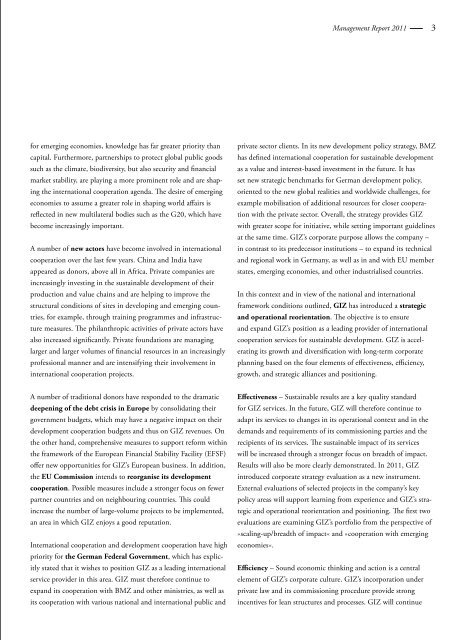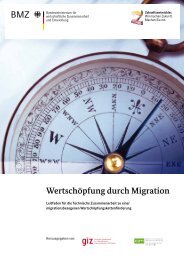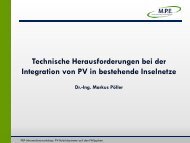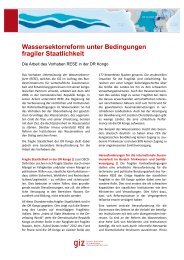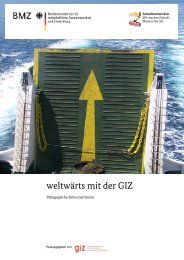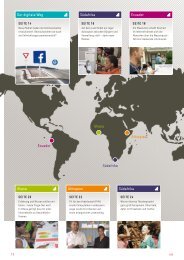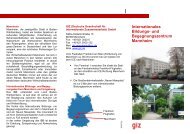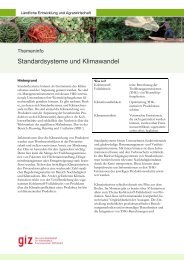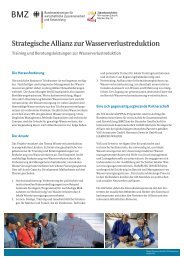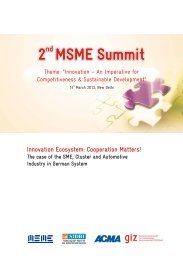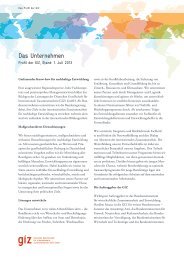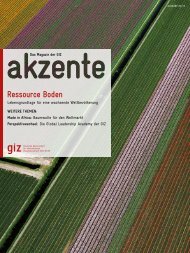Untitled - GIZ
Untitled - GIZ
Untitled - GIZ
Create successful ePaper yourself
Turn your PDF publications into a flip-book with our unique Google optimized e-Paper software.
Management Report 2011<br />
3<br />
for emerging economies, knowledge has far greater priority than<br />
capital. Furthermore, partnerships to protect global public goods<br />
such as the climate, biodiversity, but also security and financial<br />
market stability, are playing a more prominent role and are shaping<br />
the international cooperation agenda. The desire of emerging<br />
economies to assume a greater role in shaping world affairs is<br />
reflected in new multilateral bodies such as the G20, which have<br />
become increasingly important.<br />
A number of new actors have become involved in international<br />
cooperation over the last few years. China and India have<br />
appeared as donors, above all in Africa. Private companies are<br />
increasingly investing in the sustainable development of their<br />
production and value chains and are helping to improve the<br />
structural conditions of sites in developing and emerging countries,<br />
for example, through training programmes and infrastructure<br />
measures. The philanthropic activities of private actors have<br />
also increased significantly. Private foundations are managing<br />
larger and larger volumes of financial resources in an increasingly<br />
professional manner and are intensifying their involvement in<br />
international cooperation projects.<br />
private sector clients. In its new development policy strategy, BMZ<br />
has defined international cooperation for sustainable development<br />
as a value and interest-based investment in the future. It has<br />
set new strategic benchmarks for German development policy,<br />
oriented to the new global realities and worldwide challenges, for<br />
example mobilisation of additional resources for closer cooperation<br />
with the private sector. Overall, the strategy provides <strong>GIZ</strong><br />
with greater scope for initiative, while setting important guidelines<br />
at the same time. <strong>GIZ</strong>’s corporate purpose allows the company –<br />
in contrast to its predecessor institutions – to expand its technical<br />
and regional work in Germany, as well as in and with EU member<br />
states, emerging economies, and other industrialised countries.<br />
In this context and in view of the national and international<br />
framework conditions outlined, <strong>GIZ</strong> has introduced a strategic<br />
and operational reorientation. The objective is to ensure<br />
and expand <strong>GIZ</strong>’s position as a leading provider of international<br />
cooperation services for sustainable development. <strong>GIZ</strong> is accelerating<br />
its growth and diversification with long-term corporate<br />
planning based on the four elements of effectiveness, efficiency,<br />
growth, and strategic alliances and positioning.<br />
A number of traditional donors have responded to the dramatic<br />
deepening of the debt crisis in Europe by consolidating their<br />
government budgets, which may have a negative impact on their<br />
development cooperation budgets and thus on <strong>GIZ</strong> revenues. On<br />
the other hand, comprehensive measures to support reform within<br />
the framework of the European Financial Stability Facility (EFSF)<br />
offer new opportunities for <strong>GIZ</strong>’s European business. In addition,<br />
the EU Commission intends to reorganise its development<br />
cooperation. Possible measures include a stronger focus on fewer<br />
partner countries and on neighbouring countries. This could<br />
increase the number of large-volume projects to be implemented,<br />
an area in which <strong>GIZ</strong> enjoys a good reputation.<br />
International cooperation and development cooperation have high<br />
priority for the German Federal Government, which has explicitly<br />
stated that it wishes to position <strong>GIZ</strong> as a leading international<br />
service provider in this area. <strong>GIZ</strong> must therefore continue to<br />
expand its cooperation with BMZ and other ministries, as well as<br />
its cooperation with various national and international public and<br />
Effectiveness – Sustainable results are a key quality standard<br />
for <strong>GIZ</strong> services. In the future, <strong>GIZ</strong> will therefore continue to<br />
adapt its services to changes in its operational context and in the<br />
demands and requirements of its commissioning parties and the<br />
recipients of its services. The sustainable impact of its services<br />
will be increased through a stronger focus on breadth of impact.<br />
Results will also be more clearly demonstrated. In 2011, <strong>GIZ</strong><br />
introduced corporate strategy evaluation as a new instrument.<br />
External evaluations of selected projects in the company’s key<br />
policy areas will support learning from experience and <strong>GIZ</strong>’s strategic<br />
and operational reorientation and positioning. The first two<br />
evaluations are examining <strong>GIZ</strong>’s portfolio from the perspective of<br />
» scaling-up/breadth of impact « and » cooperation with emerging<br />
economies «.<br />
Efficiency – Sound economic thinking and action is a central<br />
element of <strong>GIZ</strong>’s corporate culture. <strong>GIZ</strong>’s incorporation under<br />
private law and its commissioning procedure provide strong<br />
incentives for lean structures and processes. <strong>GIZ</strong> will continue


